11.29.16
Posted in Europe, Patents at 9:33 am by Dr. Roy Schestowitz
Long delay (about half a decade), then nothing
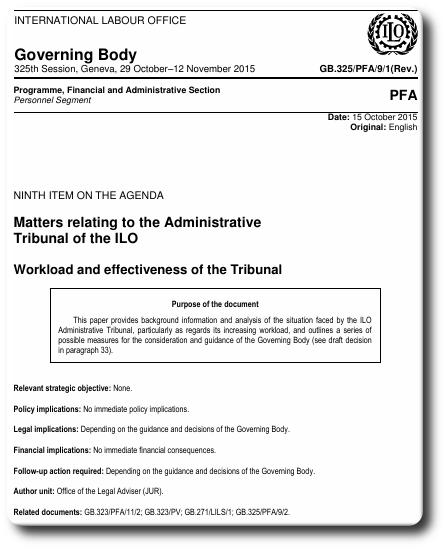
The famous report where ILO complained about EPO-induced workload
Summary: The International Labour Organisation (ILO) is once again failing too serve justice, instead just sending complaints elsewhere, in effect into a black hole
THE ILO may have its reputation, but how much does it really help labour in international institutions like the EPO? With small amounts of money in compensation (orders of magnitude less of the damage caused) or referral back to the EPO, where the notion of justice simply does not exist, what does that make ILO justice look like? It makes one wonder if there’s even any rationale at all for dealing with ILO anymore. The message they get across is that they either don’t care or just want to make it appear like they care (or both).
ILO is overloaded/flooded with EPO complaints, but that’s hardly an excuse when every pertinent case may represent a ruined life if not a ruined family. Two decisions were expected to be delivered today. Right now we cover the first, which was published along with another decision (to be covered separately). Here is local copy of this decisions, just in case of removal [PDF]. The complainant is Mr S. C. F. and the judges are Barbagallo, Hansen, and Moore. Watch how useless the outcome was:
1. The decision of 24 June 2015 is set aside.
2. The case is sent back to the EPO for examination by an Appeals Committee composed in accordance with the applicable rules.
3. All other claims are dismissed.
The extract says: “As to the complainant’s request for oral proceedings, the Tribunal notes that the parties have presented their case extensively and comprehensively in their written submissions, which are sufficient to enable the Tribunal to reach a reasoned and informed decision on the only issue that must be determined at this stage. The request for oral proceedings is therefore rejected.”
One person told us that this “case sent back to EPO for examination by Appeals Committee composed in accordance with the applicable rules. Two members of the Appeals Committee were volunteers who were not appointed by the Staff Committee as specifically required. The applicable provisions and therefore the composition of the Appeals Committee cannot be considered to be the balanced composition as provided for by the rules.”
We hope that ILO is at least aware of its utter failure to serve a perception of justice, let alone justice. It serves to show just how out-of-control today’s EPO really is. Unlike Swiss CERN, this Switzerland-based institution is quickly becoming part of the problem. Battistelli can falsely claim — as he habitually does — that people have access to outside justice; but they haven’t. █
Permalink
 Send this to a friend
Send this to a friend
Posted in Europe, Patents at 9:22 am by Dr. Roy Schestowitz
Showing their conCERN for people, not for ruthless tyrants like Battistelli

Summary: The European Organisation for Nuclear Research known as CERN is openly condemning EPO management and the Administrative Council for violation of human/labour rights, not to mention the other abuses that are rampant under Battistelli’s notorious regime
EUROPE’S most renowned scientific institution, CERN, is upset at the EPO and it doesn’t even hide it anymore. Publishing in its “CERN Bulletin” (not in Swiss but in French and in English), CERN says the following:
Here at CERN, the relations between the personnel and its delegates, the Management and the Member States take place currently in very favourable conditions, showing mutual respect, and attention to the points of view of the other parties, in order to reach a concerted position. We will take all actions within our realm to maintain this quality of relationship; but the situation at the European Patent Office reminds us that we shall remain vigilant about the due respect of the rights of the personnel and its representatives.
It is important that, as international civil servants working at CERN, we shall keep regular contacts with our colleagues from other international and European organisations, in order to stay informed, and eventually show a display of solidarity when unacceptable practice happens.
We support our colleagues at the European Patent Office in the hardship that is imposed on them by the current Presidency. We take note of the efforts that the Administrative Council of the EPO has made public, in a motion dated March 2016, to try and solve the situation, but we regret that the EPO Presidency does not follow the recommendations of its Administrative Council.
We hope that more such institutions will come forth and condemn the EPO’s management. Otherwise there might be no EPO left, just some fossil with a bunch of rotting EPs that should ever have been granted in the first place (in the name of “production”). █
Permalink
 Send this to a friend
Send this to a friend
11.28.16
Posted in America, Patents at 7:27 am by Dr. Roy Schestowitz

Summary: A week’s roundup of patent news from the United States, where there’s a mixture of good news, bad news, good reporting, and misleading (or selective) reporting
TAKING a break from European scandals and looking at the USPTO for a moment, there’s some good news and some bad news. This post is an outline of recent coverage and some interpretation of recent developments.
IoT and Other Buzzwords Targeted by Trolls
Using buzzwords for patent thickets, MIP published “Defining the IP landscape in IoT” several days ago. In simple terms , IoT is just a device with a TCP/IP stack, where IP stands for Internet Protocol, not Intellectual Property (quite a buzzword in its own right).
Another new article, published by a site that piggybacks the buzzword “IoT” (as meaningless as the buzzword “smart”), is titled “IoT Time: Don’t Feed the Trolls” and it speaks of a real and growing problem. Patent trolls, including some of Microsoft’s, are trying to tax — using patents — every device out there, even routers. One of Microsoft’s patent trolls that does this is still fighting for software patents. Here is what the article said:
The White House estimates that 62 percent of all patent-related lawsuits in 2014-2015 came from these trolls. And although it is a problem in the hardware space, it’s a much bigger one for software folks.
The New York Times in 2012 reported that the number of software patents has gone through the roof in the last few years, and software is hard for courts to nail down in terms of what, specifically, is the proprietary bit of code. Much of the code looks like any other code, even to experts, which leads to after-the-fact lawsuits asking for huge settlements years later.
Improved Patent Quality Means Less Litigation
The US patent system gives us many reasons for optimism, Trump’s presidency aside (we wrote about this last night). With better quality control in recent years the number of lawsuits sank, especially frivolous lawsuits from trolls. Here is how IAM put it:
It has been clear for most of 2016 that the number of new patent litigation cases was going to be down this year in the US. But it is now becoming ever more likely that the fall will be dramatic. According to the latest estimate from Lex Machina, the total amount of suits for 2016 is expected to be 4,586; that’s down from 5,822 last year, which was the second busiest on record.
This data from Lex Machina was mentioned elsewhere as well, though not in publications that are busy glorifying patents and attempting to inflate their value (no emphasis needed on such articles).
PTAB, Inter Partes Reviews (IPRs) and the Courts
David from Patently-O, a rather scholarly site, said that “courts continue to split on whether IPRs (reeexam, reissue, etc.) are “prosecution.””
In our view, a good analogy or parallel here is the EPO’s Boards of Appeal. Here is what David wrote:
I’ve written a lot about so-called prosecution bars (buy some of the books for Christmas gifts here! They make great stocking stuffers for toddlers), and this case is in many ways not that unusual but it does raise one interesting issue and serves as a reminder to both check your side and the other’s for folks who may need to be subjected to a bar, and its scope.
The opinion is not online that I can find but is Emerson Electric Co. v. Sipco, LLC, 2016 WL 6833741 (N.D. Cal. Case No.16-mc-80164-DMR, Nov. 21, 2016). A third party, Linear Technologies Corporation (“LTC”) was served with a subpoena that included a request for its source code. LTC sought to ensure that one of the party’s experts, Ameroth, would not have access to it because he was participating in IPRs. LTC had not instituted the IPRs and was not a party to the litigation.
Everyone agreed to amend to include a prosecution bar in the protective order (apparently it did not, before the subpoena, contain one), but the dispute was over whether Ameroth could view LTC’s source code and still participate in the IPR.
Suffice to say, we’re huge fans of IPRs and of PTAB in general. It helps ensure greater and more reliable control over the quality of patents. It’s a bit like an independent (sort of) regulator of examiners. Its very existence is enough to compel examiners to think twice before they grant a patent in error. PTAB is almost like a watchdog, i.e. the very opposite of Watchtroll who just keeps attacking PTAB. It was sorely needed for over a decade and now it’s under never-ending attacks from the patent microcosm (profiting from the absence of such oversight mechanism).
Here is a very recent article titled “Federal Circuit PTAB Appeal Statistics – November 2016″. It’s from a site of patent law firms and it says:
Through November 1, 2016, the Federal Circuit decided 128 PTAB appeals from IPRs and CBMs. The Federal Circuit affirmed the PTAB on every issue in 101 (78.91%) of the cases, and reversed or vacated the PTAB on every issue in 9 (7.03%) of the cases. A mixed outcome on appeal, where at least one issue was affirmed and at least one issue was vacated or reversed, occurred in 11 (8.59%) of the cases.
78.91% affirmation rate is very high and it’s similar to the rate of CAFC invalidations of software patents.
MIP also wrote about PTAB last week (Mr. Loney writes a lot on the subject from New York). “Though the AIA and PTAB have made strides in curtailing the practices of the non-practicing “trolls”,” it said, “patents can still be monetized through these same methods by operational and non-operational companies alike.”
Watch what PTAB does to the patent troll of Ericsson, based on this report from MIP: “In Unwired Planet v Google, the Federal Circuit has declared: “The Board’s application of the ‘incidental to’ and ‘complementary to’ language from the PTO policy statement instead of the statutory definition renders superfluous the limits Congress placed on the definition of a CBM patent””
A lot of the press coverage last week actually focused on this one case. They have been pretty much ignoring all the cases which did not suit them and instead cherry-pick this one case. We’ll deal with that separately later.
PTAB made many people realise that passing the examiners’ ‘quality’ control at the USPTO is not enough, or as IAM put it: “The extent to which patent value and validity are correlated in the current market was called into question last week at Unified Patents’ annual meeting in Silicon Valley.” To quote IAM’s headline (it’s a blog post), “To understand a patent’s true value these days you have to factor in the PTAB” (which habitually shoots down patents even after a grant and without the patents being tested in court).
Remember how companies used to issue press releases to brag about being granted a patent or two? Well, watch how PTAB too gains recognition, based on this press release:
Voip-Pal Announces the USPTO Has Denied on All Grounds Institution of Unified Patents Inc.’s Petition for Inter Parted Review Filed
Voip-Pal.com, Inc. (“Voip-Pal,” the “Company”) (VPLM) is pleased to announce that on November 18, 2016 the Patent Trial and Appeal Board (“PTAB”) of the United States Patent and Trademark Office (“USPTO”) denied on all grounds a petition for Inter Partes Review (“IPR”), IPR2016-01082, filed by Unified Patents Inc. against Voip-Pal’s Routing, Billing and Rating Patent (“RBR”), Patent No. 8,542,815 (“815”)
Patent Microcosm Makes a Mountain Out of a Molehill
As we noted above, in one particular case CAFC did not agree with PTAB. It’s one of those exceptions or rare situations. As expected, patent law firms try to use this one case against PTAB’s legitimacy and they hope to overturn software patents’ death. How many articles did we find about it last week? Plenty! See [1, 2, 3, 4, 5, 6, 7, 8, 9, 10, 11, 12, 13, 14, 15] and also “Federal Circuit Tightens Standard for AIA Review” (behind paywall), which generalises based on one single case. Greedy law firms ignored what CAFC has said about PTAB’s function until they got something that supports their narrative/business model, so now they amplify it. It obviously got PTAB foes (patent maximalists) all riled up (see Watchtroll) and various sites that wrote about it were careful to note that it’s just one case of many. If one actually bothers visiting the USPTO’s site, there’s a post there which calls PTAB a success. To quote: “As part of the USPTO’s ongoing Enhanced Patent Quality Initiative, in April 2016 we launched the Post Grant Outcomes Pilot, focused on pending patent applications that are related to issued patents undergoing an America Invents Act (AIA) trial proceeding before the Patent Trial and Appeal Board (PTAB). We’d like to report that the Post Grant Outcomes Pilot has succeeded in making examiners aware of patents related to applications they are examining that are involved in PTAB trials, and in turn has facilitated the timely and effective examination of applications.”
Here is an article about that:
Post grant pilot a success, says PTAB chief judge
A US initiative called the “post grant outcomes pilot” has been a success, according to the chief judge of the Patent and Trial Appeal Board (PTAB).
In a blog by David Ruschke, chief judge at the PTAB, and Drew Hirschfeld, commissioner for patents, the pair noted that the pilot had “succeeded in making examiners aware of patents related to applications they are examining”.
This in turn facilitated “the timely and effective examination of applications”.
As part of the US Patent and Trademark Office’s (USPTO) ongoing “enhanced patent quality initiative”, the pilot was launched in April to focus on pending patent applications that are related to issued patents undergoing an America Invents Act (AIA) trial proceeding.
We sure hope that Ruschke and his colleagues will keep their job after the Trump administration fills the swamp, as it so habitually does amid transition. It looks like Lee will be pushed out, so what will that mean for PTAB and the America Invents Act (AIA)? █
Permalink
 Send this to a friend
Send this to a friend
Posted in Europe, Patents at 5:35 am by Dr. Roy Schestowitz
Summary: A recent comment about Battistelli’s misbehaviour and the Administrative Council’s utter failure to get a grip on him
It seems to be more widely known by now, even well outside the ‘IP’ community and the EPO’s applicants (industry), that EPO needs to be saved from Battistelli. Attorneys too speak about it collectively and one attorney, Mark Summerfield, decided write the following about the EPO (bottom of blog post at IAM):
The situation at the EPO continues to be of major concern to all stakeholders, not least patent applicants who pay substantial annual maintenance fees while their applications remain pending.
In some ways it has become irrelevant who is “right” or “wrong”, or where the truth lies. When an organisation becomes dysfunctional, ultimate responsibility resides with management. M. Battistelli appears unwilling, or unable, to accept this. His response to your opinion piece sought to deflect blame elsewhere, while this reply from M. Prunier calls M. Battistelli’s honesty and integrity further into question.
At the same time we have seen a similar lack of transparency at WIPO, in various national IP offices, and in the processes of negotiating multinational treaties with significant IP provisions (e.g. the TPP). A backlash against “elites” (i.e. those who would have us lie back and blindly accept that they know what is best for us) has already produced Brexit and delivered the US presidency to Donald Trump.
My impression is that (presumably well-intentioned) people within international organisations, governments, and the public services, have decided that truly democratic processes are just too hard and inefficient, and have appointed themselves as the “expert” arbiters and executors. Those who have become the losers in this process, whether they be union reps at the EPO, or disenfranchised residents of the US rust belt, have had their fill and are crying out for their voices to be heard.
Even if everything M. Battistelli says is true, he has still failed to provide the leadership the EPO requires to evolve and adapt to the challenges facing the global IP system. The paralysis of the Administrative Council in dealing with this crisis is something of which its members should be ashamed.
We agree on that last part. Any sane member of the Council would have long ago voted Battistelli out. But as long as they collectively act like his spineless chinchillas he knows he can get away with virtually anything, even clear violations of their instructions. █
Permalink
 Send this to a friend
Send this to a friend
Posted in Europe, Humour, Patents at 4:09 am by Dr. Roy Schestowitz
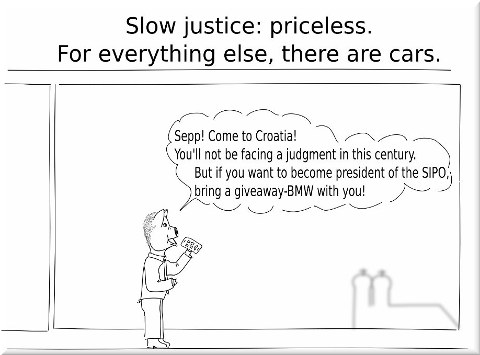
Summary: The latest cartoon making the rounds is about SLAPP and alleged bribery in Croatia (more on that soon)
Permalink
 Send this to a friend
Send this to a friend
11.27.16
Posted in America, Patents at 6:06 pm by Dr. Roy Schestowitz
Progress can be halted and regression soon follow for oligarchy’s sake
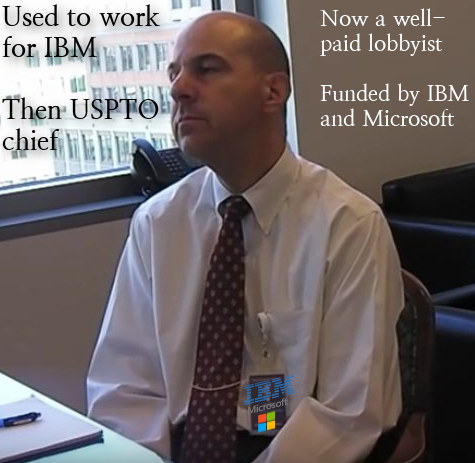
Source: David Kappos interview with Intellectual Property Magazine (2010), modified by us
Summary: Just as the USPTO begins to get its act together and limit patent scope based on reasonably liberal SCOTUS Justices there are many reports suggesting that the Director of the USPTO will be driven out, courtesy of the Trump presidency that will also perturb SCTOUS
THE USPTO has a longstanding patent quality problem, albeit with Alice and few other top-level decisions (Mayo for instance) things are improving somewhat.
The other day we found Jaguar Land Rover pursuing patents on facial recognition, which basically means software patents. I have peer-reviewed papers for international journals about this subject; no doubt this is about software patents — possibly a thing that UK-IPO would reject outright. Here is what Britain’s worst paper wrote about it:
Motorists could soon unlock the doors of their car simply by walking up to it and taking a selfie.
Jaguar Land Rover is developing technology that uses facial recognition and gait analysis to detect when owners of its vehicles approach, to open the doors for them.
Details have been revealed in a recently published patent application by Jaguar Land Rover, but it is unclear when the technology might become available.
Nothing innovative here and also it’s about software. Shouldn’t the post-Alice guidelines* at the USPTO disqualify this? How about this other new patent application? It’s one which TechDirt introduced the other day with the headline “Sony Wants To Patent A System For Scoring Journalists’ ‘Veracity’,” noting that it’s too obvious for a patent. To quote directly: “Like anyone wouldn’t have come up with such a system if there wasn’t patent protections?”
“Nothing innovative here and also it’s about software.”Let’s face it, David Kappos has made more of a farce out of this system, having worked for IBM, a big proponent of software patents. Is the leadership of the USPTO ‘on loan’ (to large corporations)? Kappos now works as a software patents lobbyist and IBM is one of his clients. It disgraces the whole patent office on ethical grounds and nobody seems to mind.
Looking at some scholarly figures from Patently-O (published this past week, probably for some paper of his), it seems evident that Kappos did a lot of damage to patent quality. As Patently-O put it: “You’ll note the discontinuous nature of the average-PTA chart. The break-point in early 2010 shows the impact of the Federal Circuit’s Wyeth decision holding that the PTO had been under-calculating the adjustment.”
That’s also the Kappos impact. Here is another new graph. This graph, in our assessment, may simply mean that patent law firms broaden their applications’ “template” (notably with citations) in order to patent some more junk and make it seem credible, well-researched. To quote: “The number of references cited per patent continues to rise, albeit more slowly in recent years. For patents issued in 2016, the average patent includes more than 50 cited references. In my view – this is great, although it would certainly help if the examiner was given some clue as to why the reference is deemed relevant or what portion of the reference is relevant. (If an examiner has a question, they can ask the applicant). A not-surprising facet of the growth in references-cited is that almost all of the growth is in applicant-cited. Compared with 10 years ago, applicants cite 26 more references per patent (on average) while examiners cite only 1.5 more per patent. As you might also note from the difference between median and average – the citation distribution is highly skewed. Example: If we take the top-5% of patents from 2016 (those with the most references cited) – they include 35% of all of the cited references. My experience with this skew is that patent applicants considered more valuable by their owners are more likely to submit more prior art references.”
“Let’s face it, David Kappos has made more of a farce out of this system, having worked for IBM, a big proponent of software patents.”There is another new graph at Patently-O and the way we interpret it is quite simple: Quality of patents at the USPTO (or complexity of patents) is declining. Patent examiners don’t seem to mind. The more, the merrier.
One last post from Patently-O alludes to Donald Trump and notes that the majority of patents in the US are not even from the US. The part about ITC (where the I should stand for US, not “international”) says: “In an email, Prof. Mark Lemley suggests that we should look for “a rise in the importance of the ITC as we focus on blocking imports.” The ITC’s primary goal is to protect U.S. industries against unfair international trade. Lemley writes: “One interesting question is whether Trump will move the ITC’s jurisdiction back to its roots by insisting on a real domestic industry requirement.” Additional ITC movement could push-back against U.S. patents that are owned by foreign nations or unduly subsidized by a foreign nation.”
“He’ll turn the USPTO into a Great Swamp Again.”We criticised the ITC many times. It’s just an apparatus of US protectionism, so the I in the acronym is not suitable, like the W in WTO. Another article about Trump’s impact, this time from MIP, says: “A panel on the US election at the IP Dealmakers Forum speculated that the Trump administration may take a long time to appoint a USPTO director and the Republican leadership that worked on patent bills in the previous Congress will again push for reform” (we already noted that USPTO Director Lee may be on her way out).
We expect Trump to make the US patent system even worse, as corporate interests tend to be prioritised over people, based on his recent appointments. He’ll turn the USPTO into a Great Swamp Again. As for SCOTUS, expect more Conservative Justices there (not just a Scalia replacement), complete with preference for large corporations like Trump’s. █
__________
* According to this new placement in IAM, the “USPTO seeks public comment regarding subject-matter eligibility” (covered here before). To quote: “On October 17 2016 the US Patent and Trademark Office (USPTO) announced that two roundtables will be held in the coming months to discuss patentable subject matter eligibility under 35 USC § 101. The roundtables have been set up to facilitate public comment and discussion regarding the USPTO’s current guidance on subject-matter eligibility as well as case law arising from interpretation of the requirements under 35 USC § 101.”
Permalink
 Send this to a friend
Send this to a friend
Posted in Deception, Europe, Patents at 5:11 pm by Dr. Roy Schestowitz
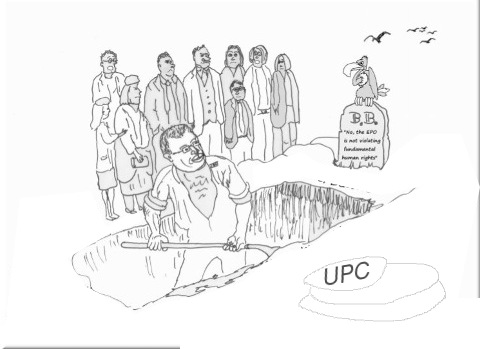
Summary: Team UPC, a collective of self-serving patent lawyers who produce nothing of substance, hopes that some time tomorrow the UPC will miraculously be revived in Britain even though it’s extremely unlikely
THE Unitary Patent (or UPC) will quite likely have its death reaffirmed tomorrow. Don’t expect Team UPC to admit this though. The UPC-centric bloggers from Bristows will carry on (now there’s “EQE roundup”) and so will the bloggers at Kluwer Patent Blog. We kindly remind readers that these people have a track record of even advertising false jobs, so don’t believe Team UPC and the EPO (chronic liars). It’s their wallet/agenda that speaks.
Thankfully for us, Battistelli cannot quite ‘buy’ the vote (or bribe) the UK for UPC ratification (it would require too big a gift), so the UPC is going nowhere here. Kluwer Patent Blog, a huge proponent of the UPC, cited Bristows (an integral British part of Team UPC) to come up with a bizarre headline that says “Announcement expected about participation UK in Unitary Patent and Unified Patent Court” (as if they already know in advance what will happen). To quote:
According to a Bristows report, ‘the UK Minister of State for Energy and Intellectual Property, Baroness Neville-Rolfe, will state how the UK intends to proceed regarding its participation (or not) in the system’.
Since the Brexit vote, the future of the UP system has been clouded in uncertainty. Ratification by the UK of the UPC Agreement is mandatory for the launch of the system, but after the Brexit vote it seemed this requirement could kill the UP, as it wasn’t sure at all the UK would still be prepared to remain in the new patent system.
There are no signs that Lucy Neville-Rolfe will override British democracy, so we don’t expect much to happen. As for Kluwer Patent Blog, watch the headline it produced two days earlier (merely a quote), seemingly giving instructions from self-serving firms in Italy so as to save the UPC.
Truth be said, the UPC is in a limbo or in a death spiral/crawl. As we saw in TTIP and TPP, nobody in the “inner circles” wants to admit the death until it’s finalised and truly irreversible. Unless it’s redesigned completely, it has no chance. “EU Software Patents future will be decided tomorrow,” Benjamin Henrion wrote, “in the EU Council with the fate of the Unitary Patent,” but nothing will change. The UPC (as we know it, after several other names) is dead and endless lobbying by Team UPC has changed nothing at all, it just exposed Team UPC’s crudeness and disdain for democracy.
“More Brexit foot shooting,” one person wrote, “as UK now excludes itself from EU wide patent court due to start work in London. Bad news for patent lawyers…”
Henrion asked, “any link to an official source?”
This seems to contradict the optimism from Bristows, who have spread falsehoods (attempting to spread self-fulfilling prophecies) for at least a year. “A big day for the European patent systems,” wrote an anonymous EPO observer, but as we wrote over the weekend, we expect nothing substantial to change. The “UK [is] set to announce its UPC position tomorrow,” IAM (presumably Joff Wild) wrote. “We have worked through a few scenarios…”
“It seems that the future of the #upc #unitarypatent will be decided on Monday,” another person wrote, but IAM responded with: “This is most likely, but don’t rule out a delayed ratification after safeguards are established for UK’s post-Brexit position.”
Don’t trust IAM so much. Remember it organised pro-UPC propaganda events (even abroad) with support from the EPO and funding from the EPO's PR firm. Also, IAM is still not good at disclosures* and there is another such event coming soon.
Shooting down the UPC is not “foot shooting” as the above put it, unless of course the British economy boils down to just a handful of greedy patent lawyers seeking to maximise profit by patent battles. Right now, as before, some patent law firms in Italy hope to snatch this business and according to this, “A. M. Pizzoli [was] talking about #UnitaryPatent at #FICPI Sweden meeting: Swedes still optimistic in spite of Brexit-related issues” (by “Swedes” he means some Swedish patent lawyers, not Swedes at large).
The UPC would obviously sacrifice patent quality, bring patent trolls from the US patent system, and probably serve as a weapon against the EPO‘s Boards of Appeal, especially judges. No doubt they're essential, but they are crushed by Battistelli. There were a couple of articles from patent law firms in the media this past week, both of which spoke about the Boards of Appeal of the EPO. Here they are:
1. Exceptions to reformatio in peius at the EPO
In T 2129/14, the EPO Boards of Appeal applied the exception to the prohibition of reformatio in peius established in G 1/99 to allow the patentee, as respondent, to make an amendment which extended the scope of protection of the patent in question compared to the scope of protection maintained by the Opposition Division.
The prohibition of reformatio in peius set out in G 9/92 is the principle that in appeal proceedings a decision must not be reached which puts a sole appellant in a worse position than if they had not appealed. Thus, where a patent is maintained in amended form by an Opposition Division and only the opponent appeals the decision, the patentee, as respondent, cannot amend the claims such that the scope of the patent after appeal proceedings is broader than after opposition proceedings.
2. Admissibility at the EPO’s Boards of Appeal – a change in practice?
The practice of the Boards of Appeal of the European Patent Office (EPO) in recent years (following decision T 1067/08 (High-activity phytase/BASF); and discussed in detail in the Case Law of the Boards of Appeal, 7th Edition IV.C.1.3.3) has been not to review discretionary decisions made during first-instance proceedings. By way of example, if an Opposition Division has taken a decision not to admit a document (eg new evidence or a new claim request), the Board of Appeal will generally not overrule that decision if it concludes that the Opposition Division had the right to exercise its discretion.
The following too got published: EPO Practice Infringement of Second Medical Use Claims in Europe
It is possible to obtain a patent from the European Patent Office (EPO) based on a new medical use of a known drug. The claim can be directed to using the drug to treat a different disease, or using the drug in a new method of treatment, such as a new route of administration or a new dosage. The EPO has wellestablished requirements for the patentability of these so-called “second medical use” claims, but it does not consider issues of patent infringement. Infringement in Europe is currently assessed on a country-bycountry basis by individual national courts.
Although these second medical use claims have been available in Europe since the 1980s, until recently it has been unclear how the manufacture and sale of a drug for a patented use can be distinguished in practice from the manufacture and sale of the same drug for a non-patented use. The English Court of Appeal has now clarified how infringement of such second medical use claims should be assessed in the United Kingdom.
Our main concern, as we noted here very recently, is that patent scope and thus patent quality at the EPO is compromised for the sake of patent maximalism — the same kind of thing that Team UPC strives to introduce. One might even dub it patent radicalism, not maximalism. █
_____________
* To give one new example of missing disclosures from IAM, watch what it said about patent troll MOSAID, a.k.a. “Conversant” (after the rename that helped dodge negative publicity), just a few days ago. Nowhere does the article mention that Conversant paid IAM. Instead it’s all just promotional language, e.g.: “Conversant IP Management has acquired a patent portfolio from Panasonic, according to an assignment recorded with the USPTO earlier this week. The transfer represents a new foray into the Japanese patent marketplace for the Canadian NPE after its role in managing the Elpida portfolio ceased earlier this year.”
Permalink
 Send this to a friend
Send this to a friend
11.26.16
Posted in Europe, Patents at 5:33 pm by Dr. Roy Schestowitz
The Liar in Chief
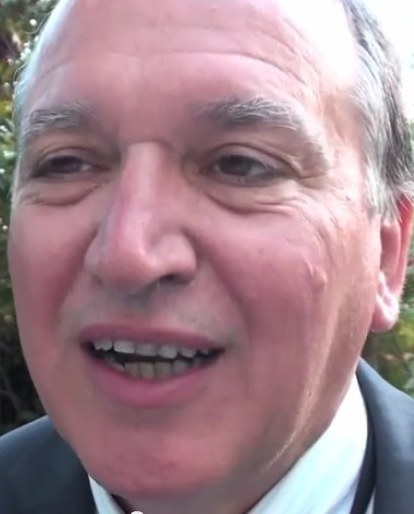
“A fish rots from the head down”
Summary: Benoît Battistelli’s decision to dismiss staff representatives (in complete violation of what the Administrative Council demanded) is accompanied by yet more face-saving lies (clearly a sackable offense in a public institution which is functional and not a global laughing stock)
NOTHING that we see at the EPO surprises us anymore. In fact, we’ve become accustomed to assuming (and safely so, based on recent experiences) that everything EPO management says is a lie. It’s no exaggeration to say that the EPO is now in “Blatter mode” as the epic scandal continues to deepen.
Laurent Prunier responds to the EPO’s claims in a followup article from WIPR. Here is a portion:
Laurent Prunier, former elected member of the central staff committee and secretary of the Staff Union of the European Patent Office (SUEPO) in The Hague, has responded to statements made by the European Patent Office (EPO).
Earlier this month, Prunier was dismissed. He had been accused of harassment and defamation, but denied the claims.
Yesterday, November 24, WIPR reported staff members were holding a demonstration to show solidarity with “dismissed, downgraded and targeted staff representatives and SUEPO officials”.
Now Prunier has responded to a number of assertions made by a spokesperson for the EPO, stating that they presented a number of “incorrect facts”.
According to Prunier, the EPO’s spokesperson has no access to the investigation reports and to the disciplinary files, as they are confidential, meaning that they are in no position to certify that “all the rules were followed”.
The EPO got caught lying again, as its nasty PR department (with that TI conflict of interests) prefers to just say what sounds good rather than what’s true; it lies all the time and it gets caught even in circular lies or chaining of lies (one lie that helps cover up another). What a total mess!
Here is how one comment put it the other day:
WIPR published yesterday an article article about the dismissal of Prunier, and cited the statement of the Office that “The procedures were conducted according to our rules, which compare favourably to other international organisations [...]” etc. etc.
Today, they published the response of Prunier, who notices that “the EPO’s spokesperson has no access to the investigation reports and to the disciplinary files, as they are confidential, meaning that they are in no position to certify that “all the rules were followed” and further challenges every statement of the EPO spokeperson.
The EPO declined to further comment.
It’s worth reading.
Here is what another person said, regarding leaks that we openly called for (leaks related to this case):
Some honest and brave AC members who understand what is going on here should ask BB for the investigation reports of Prunier and for an overview in detail of which rules were followed. BB will never give the reports and that overview. It is clear why. Be honest, should you put your head in a guillotine? Leaking of that information is urgently desired. The EPO should further urgently sign the European Convention on Human Rights.
If anyone other than Prunier leaks these documents to us, Prunier himself cannot be punished as the leaks are not within his control or his own fault. We welcome any information readers may have on this case. The world deserves to know what goes on before Battistelli proceeds to dismissals of more staff representatives at The Hague (disciplinary procedures have already been initiated against more of them and they are not allowed to speak about that). It’s a reign of terror.
As Prunier made abundantly clear, these procedures against him were initiated not by ordinary staff but by a close associate of Battistelli, possibly Bergot (it’s hard to know without leaked documents).
Here is one quoteworthy comment from today. It makes a good case for the dismissal of Battistelli and reinstatement/compensation to those whom he attacked for attempting to save the EPO:
In March the Council requested the President:
1)to ensure that disciplinary sanctions and proceedings are not only fair but also seen to be so, and to consider the possibility of involvement of an external reviewer or of arbitration or mediation
2)pending the outcome of this process and before further decisions in disciplinary cases are taken, to inform the AC in appropriate detail and make proposals that enhance confidence in fair and reasonable proceedings and sanctions;
3)to submit to the AC a draft revision of the Staff Regulations which incorporates investigation guidelines (including the investigation unit) and disciplinary procedures which have been reviewed and amended;
4)to achieve, within the framework of the tripartite negotiations, an MOU simultaneously with both trade unions, which would have no pre-conditions or exclude any topics from future discussions;
5)to submit proposals to the AC at its June 2016 meeting, after discussion in B28, for immediate implementation of the structural reform of the BOA, on the lines of the 5 points agreed by the AC at its December 2015 meeting and of the legal advice given by Prof. Sarooshi, and taking into account comments from the Presidium of the BOA;
6)to submit proposals to the AC at its June 2016 meeting, after discussion in B28, for reinforcement of the AC secretariat and a clarification of its position in terms of governance.
Nine months afterwards he managed point 5 only with great help from the Council and with a widely criticized text, which the Council accepted only because they desperately needed some kind of reform.
In points 1,2,3,4,6 he completely failed.
Is it time to look for a President with the skills and will to carry out his mandate?
We welcome leaks related to the case. Surely there are at least a handful of people who have access to the documents and can send portions anonymously to us. Remember that in over 10 years we never compromised a source. █
Permalink
 Send this to a friend
Send this to a friend
« Previous Page — « Previous entries « Previous Page · Next Page » Next entries » — Next Page »
























 Content is available under CC-BY-SA
Content is available under CC-BY-SA